Suivi et évaluation
La plupart des défis liés au suivi et à l’évaluation, comme la quantité insuffisante d’investissements et le manque de capacités, ne sont pas spécifiques à l’assistance monétaire, mais ceux qui le sont concernent principalement le suivi des résultats des transferts non affectés. La flexibilité des transferts monétaires peut compliquer la définition d’indicateurs de résultats appropriés, qui pourraient impliquer un mélange d’indicateurs spécifiques au secteur et transversaux. En parallèle, il existe des limitations au moment de collecter des données précises sur la manière dont les transferts monétaires sont dépensés.
Les signataires du Grand Bargain se sont engagés à garantir que des mécanismes de suivi et d’évaluation pertinents des transferts monétaires soient en place, et à assurer une meilleure compréhension des coûts, avantages, impacts et risques de cette modalité par rapport à d’autres. En partant de cet engagement, le chantier du Grand Bargain sur les transferts monétaires a établi plusieurs points d’action, dont le développement d’indicateurs de résultats communs pour les transferts monétaires à usages multiples, et des indicateurs pour l’analyse de l’optimisation des ressources. L’analyse systématique de l’optimisation des ressources a été rendue difficile par plusieurs facteurs, dont un manque d’approches approuvées, le besoin en données sur les résultats en termes de qualité et le caractère intensif de l’analyse.
Priorités actuelles
Dans le cadre des engagements du chantier du Grand Bargain sur les transferts monétaires, le CALP Network a co-dirigé (avec l’USAID et CRS) la mise au point d’indicateurs de résultats des transferts monétaires à usages multiples. Le projet à tester est actuellement disponible en anglais, espagnol et français, via la bibliothèque.
Initiatives associées
Contenu présenté

Indicateurs de résultats des transferts monétaires à usages multiples : Projet final à tester
Guides et outils
Les indicateurs présentés dans ce document se concentrent sur les principaux objectifs des TMUM humanitaires et sur les résultats auxquels les transferts monétaires à usages multiples peuvent le plus fortement contribuer. (Par exemple, certaines interventions en TMUM visent à relier les personnes aux systèmes de protection sociale après la fin du TMUM; mais nous n’avons pas inclus...

Monitoring 4 CTP: Monitoring Guidance for CTP in Emergencies
Guidelines and Tools
This guidance provides a central resource to promote a common understanding of the most important monitoring considerations for humanitarian projects using cash transfer programming (CTP). The primary audience for this guidance is field-level practitioners, from organisations directly involved in the design, implementation, monitoring, and accountability of projects using cash and vouchers...

Cost-Efficiency Analysis of Basic Needs Programs: Best Practice Guidance for Humanitarian Agencies
Guidelines and Tools
The Efficiency, Effectiveness and Value for Money Sub-Workstream is pleased to share the final output on Cost-Efficiency Analysis of Basic Needs Programs: Best Practice Guidance for Humanitarian Agencies (attached).
Cost-efficiency analysis estimates the ratio of program costs to outputs created, allowing you to compare cost-per-output for programs which all produced the same output. Such...
Thematic lead
Contenu récent
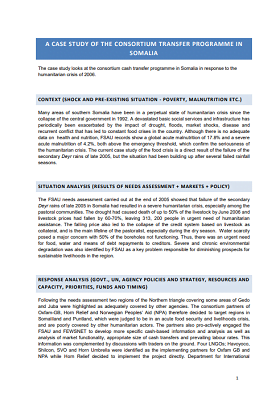
A case study of the consortium transfer programme in Somalia
Case Study
This case study looks at a consortium cash transfer programme in Somalia in response to the humanitarian crisis of 2006. Details of the context, response analysis and rationale for choosing cash for work and direct cash relief interventions are given along with the programme summary. Perceived impacts and...
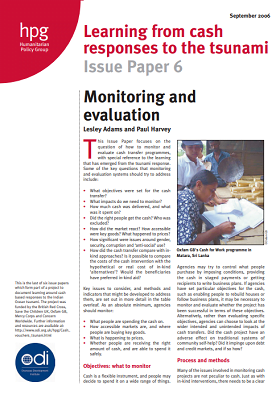
Learning from Cash Responses to the Tsunami: Issue Paper 6: Monitoring and Evaluation
Report
This is the last of six issue papers which form part of a project to document learning around cash-based responses to the Indian Ocean tsunami. The project was funded by the British Red Cross, Save the Children UK, Oxfam GB, Mercy Corps and Concern Worldwide. This Issue Paper focuses on the question of...

Water Access by Voucher
Report
This document presents an overview of the use of vouchers to connect vulnerable people in Somalia with water during an emergency response. The document provides thorough and practical guidance to implementing a water voucher programme, covering all phases of the project cycle including: programme...

Meeting Humanitarian Challenges in Urban Areas: Review of Urban Humanitarian Challenges in Port-au-Prince, Manila, Nairobi, Eldoret
Report
Following recommendations of the IASC Task Force on MHCUA, Nairobi, Eldoret and Manila and Port au Prince were adopted as representative case studies. They reflect recent and different types of sudden onset emergencies and disasters (urban violence, severe flooding and hurricanes, earthquakes) impacting...

Evaluation of OGB and HR Cash Consortium in Southern Somalia
Report
In response to the humanitarian emergency of 2006 in southern Somalia, a consortium of five agencies – Oxfam GB, Horn Relief, AFREC, WASDA and Development Concern – implemented the Emergency Drought Response Action (EDRA) programme. This was a cash-based intervention using an innovative approach with...
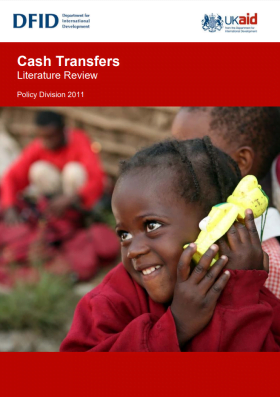
DFID Cash Transfers Literature Review
Report
This paper provides a synthesis of current global evidence on the impact of cash transfers in developing countries, and of what works in different contexts, or for different development objectives. Cash transfers are direct, regular and predictable non-contributory cash payments that help poor and...
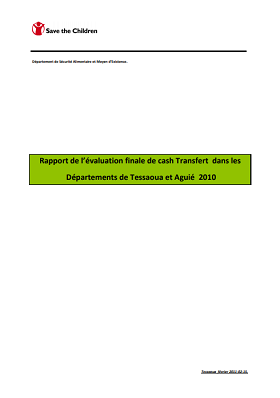
Rapport de l’évaluation finale de cash transfert dans les Départements de Tessaoua et Aguié 2010
Rapport
Ceci est le rapport final d’un programme de “cash for training” (argent contre formation) qui a eu lieu en 2010 dans les départements de Tessaoua et Aguié au Niger. Le rapport résume les activités realisés, les objectifs, les résultats attendus et la méthodologie du programme, et...
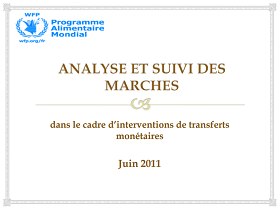
Analyse et suivi des marches dans le cadre d’interventions de transferts monétaires
Présentation
Objectifs principaux de l’analyse et du suivi des marchés: Analyser la capacité des marchés à absorber un surplus de demande généré par les activités de transferts monétaires. Emettre des recommandations en temps réel, c’est- à-dire dans le cours du programme. Evaluer l’impact des...

Evaluation of Cash Relief Programme implemented by Horn Relief
Report
This evaluation of the Emergency Cash Relief Programme (ECRP) was conducted between the 10th -22nd of June 2004. The evaluation looked at the various issues of programme operation and management, including financial management, and used an overall performance-scoring matrix for this purpose. The overall...

An Evaluation of Save the Children’s Cash Transfer Project in Aweil East County, Northern Bahr el Ghazal State, South Sudan
Report
Since April 2009, Save the Children have been implementing an ECHO-funded cash transfer project in Baac Payam, Aweil East County. The specific objective of this project has been to improve dietary diversity and nutritional outcomes among the targeted households that inhabit a part of Sudan which has some...
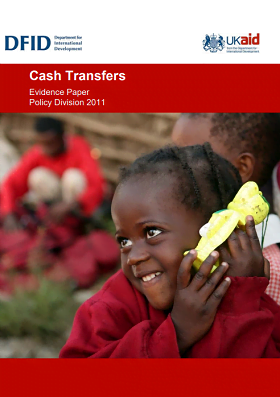
Cash transfers: Evidence paper
Report
This DFID evidence paper provides a synthesis of current global evidence on the impact of cash transfers in developing countries in achieving a range of social and economic policy objectives. It examines design and implementation choices for tailoring programmes to particular objectives, notably social...
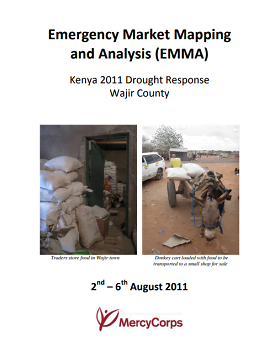
EMMA – Wajir, Kenya
Report
Mercy Corps conducted an adapted Emergency Market Mapping and Analysis (EMMA) assessment in Wajir County of Kenya from 2-6 August 2011. The assessment was organized as a response to the hunger crisis resulting from the worst drought in the region in the last 60 years. The EMMA methodology was adapted...
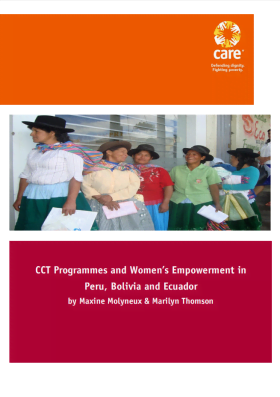
CCT Programmes and Women’s Empowerment in Peru, Bolivia and Ecuador
Report
Latin America’s efforts to alleviate poverty have resulted in reducing poverty in twelve countries, most strikingly in Mexico and Brazil. The adoption of Cash Transfer programmes in much of the region is credited with helping to bring this reduction about. These programmes are widely promoted as a cost...
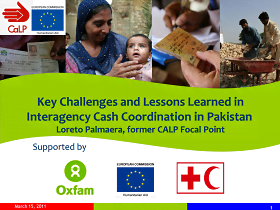
Key Challenges and Lessons Learned in Interagency Cash Coordination in Pakistan
Presentation
A presentation from the CALP Network’s former focal point Loreto Palmaera on ‘Key Challenges and Lessons Learned in Interagency Cash Coordination in Pakistan’
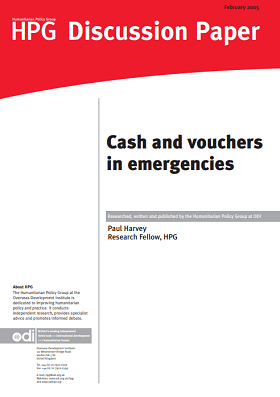
Cash and Vouchers in Emergencies
Report
This HPG discussion paper examines all aspects of using cash and vouchers to assist people in emergency situations. It provides a background to the literature and theory around cash and vouchers, looks at the current picture through selected examples and examines the decision making process on the...
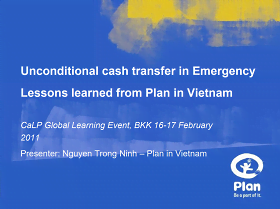
Unconditional cash transfer in Emergency Lessons learned from Plan in Vietnam
Presentation
A presentation from the the CALP Network Global Learning Event, BKK 16-17 February 2011. Topics covered include: Implementation process Findings after intervention Strengths and weaknesses Lessons learned Presenter: Nguyen Trong Ninh – Plan in Vietnam
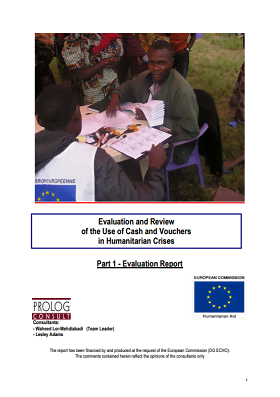
Evaluation and Review of the Use of Cash and Vouchers in Humanitarian Crises
Report
This report is the second of two reports commissioned by DG ECHO to support the development of a coherent policy regarding the use of cash and vouchers in humanitarian crises. The first report evaluated DG ECHO’s partners’ use of cash and vouchers. This second report reviews cash and voucher...
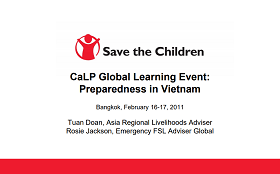
Cash Preparedness in Vietnam
Presentation
A presentation from the the CALP Network Global Learning Event, addressing Save the Children’s Preparedness in Vietnam Bangkok, February 16-17, 2011. Topics include: Emergency preparedness Cash intervention design Lessons learned

ATM cash assistance: Does it work?
Report
This 2-page article describes UNHCR’s cash assistance to almost 5,000 vulnerable Iraqi refugee families in Jordan. It looks at the key questions asked in UNHCR about implementing cash-based assistance, and highlights findings about cost-effectiveness and beneficiary well-being.
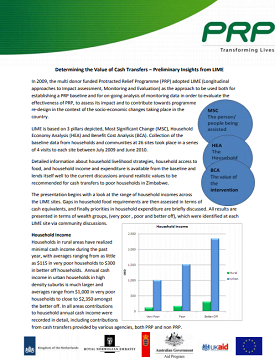
Determining the Value of Cash Transfers – Preliminary Insights from LIME
Report
In 2009, the multi donor funded Protracted Relief Programme (PRP) adopted LIME (Longitudinal approaches to Impact assessment, Monitoring and Evaluation) as the approach to be used both for establishing a PRP baseline and for on-going analysis of monitoring data in order to evaluate the effectiveness of...
